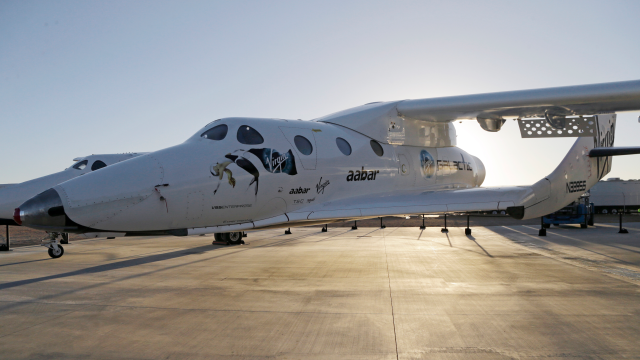Yesterday, somewhere in the Mojave desert, investigators began the long process of understanding the events that led to the tragic accident that killed one pilot and left another injured. And even after they finish, plenty of questions about the future of the commercial space industry will remain. But the one we’ll always know the answer to is if space travel is worth pursuing.
In a bizarre twist of fate, two separate accidents struck the private spaceflight industry this week. When Antares — a rocket developed by the 32-year-old private company Orbital Sciences Corporation — Neil deGrasse Tyson, who both tweeted that “space is hard,” a charmingly matter-of-fact truth.
At a press conference yesterday, officials echoed the same sentiment. “Space is hard,” said Virgin Galactic’s CEO, George Whitesides. But it felt less like a rallying cry and more like a concession, delivered by shellshocked executives who clearly had not expected to be reporting news of a tragedy — or as one official referred to it during the press conference, a mishap. After a pause, Whitesides made an addendum to his sentiment: “Today was a tough day.”
In the face of a heartbreaking accident, it is natural to question the great Why of the situation. “We’re human, and it hurts,” as Space Port CEO Stuart Witt said. It comes with the territory of tragedy: We want to make sure this never happens again. We want someone to blame.
In the case of SpaceShipTwo, it’s especially easy to cast blame and question motives. The saga of Virgin Galactic’s engine woes is long and tortured, as Douglas Messier explained in an excellent piece on Parabolic Arc one day before the accident. Yesterday was the first test of a system that represented the culmination of years of work, and the potential to make good on a promise to take a rolodex of more than 700 paying customers to space.
That a pilot died testing the new system feels anything but fair, and outrage has flowed since the crash. “Virgin Galactic is building the world’s most expensive roller coaster, the aerospace version of Beluga caviar,” said Adam Rogers writing in Wired. “People are going to talk about Giant Leaps for Mankind and Boldly Going Where No One Has Gone Before. And we should call bullshit on that.”
It’s true that Virgin Galactic is a business, one that depends on high-priced tickets for the very wealthy. It used the cash from those tickets to spend years trying to find a viable engine for its second spacecraft. But it’s short-sighted to say that Virgin Galactic catering to the rich precludes the company from participating or contributing to the ongoing quest to travel to space. And in reality, the journey beyond Earth has never been such a pure endeavour.
For better or worse, major jumps in technological progress are rarely motivated by anything simple or rational, as Messier points out in his piece (which you should really read). To argue that private companies aren’t contributing to space exploration isn’t just an oversimplification, it’s a romanticization of the Space Race, when NASA’s poetics about humanity and exploration served as a foil, no matter how sincere, for beating the Russians. That’s not a bad thing; it got us to the Moon. But it’s silly to suggest that those two things — self-interest and exploration — are mutually exclusive.
The Space Race gave way to the era of the Space Shuttle, and later, the defunding of NASA. Those budget slashes led us to today, and the birth of private space companies that stepped in to fill the void. The Ansari X prize and the projects it funded are the products of our current reality, one where great technological progress relies not on the funds of the Federal governments, but the largesse of billionaires. Like early commercial airlines that only the wealthy could afford, these companies are an early vanguard, not the final goal. Former astronaut Leroy Chiao, writing for CNN, called the privatization of space travel “the logical evolution of technology and commercialization, following the same path as the development of the aeroplane and commercial air transportation.”
Private space companies are the inevitable end result of the socioeconomic circumstances of our world. Some of these companies fund their work by selling a high-priced chance to visit the upper reaches of our atmosphere. Others sell space on their rockets to NASA and other government agencies. But they all represent the future of space travel, because they are all searching for ways skyward. Virgin Galactic’s decade-long project of building and testing engines contributed valuable data to our general knowledge about aerospace engineering. And though its future is uncertain — the company doesn’t have a second spacecraft waiting in the wings, and the time and cost to rebuild will be enormous — it’s impossible to argue that its successes and failures contributed nothing to the push towards space.
Space tourism is not the goal. It is a pragmatic business model for companies that don’t have the budget NASA once enjoyed. In time it may fade as a better, safer development model takes hold, but for now, it is a means to an end, a stepping stone that we must continue to aim for. Shuttling the rich into space is not the future of space exploration, just like early international air travel companies that catered only to the very wealthy were not the future of commercial flight. But the technological progress that it achieves is, and it will inevitably contribute to the development of a new generation of rocket engines and craft that will lead us further into space.
Yesterday was a tragedy — but it was never in vain.
Lead image: AP Photo/Reed Saxon.
